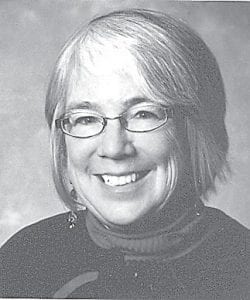The Reverend Mary Ellen Ashcroft, Ph.D., does a good job encouraging people to get “centered,” but she is the first to admit that she’s not always there herself.
Ashcroft was the featured speaker at a Women’s Business Luncheon that was held at the Pie Place Wednesday, October 28, 2009. Thetitle of her presentation was Nurturing Your Inner Life: Practical Ways
for Busy People to Balance and Center.
Ashcroft, an Episcopal priest and mentor at Spirit of the Wilderness Episcopal Church on Maple Hill, is cofounder of WindCradle Retreat east of Grand Marais. She has authored a number of books and has spoken at events throughout the U.S., Canada, and England.
Being centered means your inner self is in a stable place and you’re not so affected by what goes on around you, Ashcroft said.
Ashcroft asked the businesswomen present how they feel and act when they are not
centered. A lot of people said they eat compulsively. They listed a lot of other things as well, including feeling anxious, angry, unfocused, overwhelmed, guilty, tired or hyper and doing things like isolating, losing boundaries, grinding teeth, being crabby, freezing up, becoming inefficient, having trouble sleeping, and making a lot of lists.
To be off-center or ungrounded is to not be in touch with oneself, Ashcroft said. She saw a lot of this when she was in graduate school. The women laughed when she said people in academia “take everything so seriously because the stakes are so small.”
People who are uncentered are not okay with themselves, so they look outside themselves for things that make them feel okay, Ashcroft said, but those things will never be enough.
Ashcroft said after becoming ordained, she was very nervous about conducting her first wedding. She worried about doing and saying all the right things so the event would be just right. When the music started, a 20-year-old man with Down’s Syndrome, the son of one of the people getting married, spread his arms, closed his eyes and started to sing — tonelessly. She could see he was centered on the moment, and that helped her realize the event was not about her. She was better off not worrying so much about her own performance and noticing more of what others around her were experiencing.
Although we get more positive feedback for the things we do when we are busy, Ashcroft said, we would be better of if we concentrate the things that are really important. “On my deathbed, is this really going to matter?” she asked. “What’s really important?”
Part of figuring out what is really important to us can be understanding who we really are. An abbot at a monastery once told Ashcroft, “All God wants is for us to be who we really are, but many of us never take the time to find out what that is.”
Ashcroft offered several ways to become centered: Take a Sabbath, she said.
“Originally, Sabbath was a gift. It was God saying, ‘Relax!’” She suggested that people claim time to spend in nature. Prayer, meditation, and focused breathing help with centering and can be done while knitting or doing other handwork, she said. She recommended developing a support network.
Others suggested spending time with family and pets, cooking, enjoying music, journaling, gardening, and laughing. They suggested 12-step programs, exercising, and engaging in “impractical fun.” Taking time do to these things may require negotiation with the people in one’s life.
Getting centered is vital for mental and physical health, Kelly Hanson said.
“How are you going to give yourself permission to do this?” Ashcroft asked.
“Schedule it,” said Molly Hicken.
We need to be disciplined about joy, Ashcroft said. Taking time to get centered can become as automatic as having a cup of coffee in the morning. You need to get the oxygen mask on your own face before you can help others with theirs, she said.
It’s okay not to be perfect, Joyce Heiskari said.
“Dare to be adequate!” Ashcroft replied. That became the theme phrase among her graduate school associates.
People are often defined by what they do, who they’re married to, how big their house is, or what organizations they belong to, Ashcroft said. Those might not be the things that matter to you on your deathbed.
WindCradle Retreats offer men and women opportunities to figure out what’s important to them and get centered. Discounts of $150 off a $350 retreat are offered to local residents, and scholarships are available.
The monthly Women’s Business Luncheon is sponsored by Cook County Higher Ed and the Northeast Entrepreneurial Fund.



Loading Comments